
Palestine competed at the 2011 World Aquatics Championships in Shanghai, China between July 16 and 31, 2011.

Palestine competed at the 2011 World Aquatics Championships in Shanghai, China between July 16 and 31, 2011.
Palestine qualified 3 swimmers. [1]
| Athlete | Event | Heats | Semifinals | Final | |||
|---|---|---|---|---|---|---|---|
| Time | Rank | Time | Rank | Time | Rank | ||
| Tawil Majd | Men's 50m Freestyle | 26.65 | 79 | did not advance | |||
| Gebrel Ahmed | Men's 200m Freestyle | 2:02.27 | 56 | did not advance | |||
| Men's 400m Freestyle | 4:18.40 | 44 | did not advance | ||||
| Athlete | Event | Heats | Semifinals | Final | |||
|---|---|---|---|---|---|---|---|
| Time | Rank | Time | Rank | Time | Rank | ||
| Hazboun Sabine | Women's 50m Freestyle | 29.16 | 56 | did not advance | |||
| Women's 50m Butterfly | 31.12 | 41 | did not advance | ||||

The Levant is the subregion that borders the Eastern Mediterranean sea to the west and core West Asia, or by the political term, Middle East, to the east. In its narrowest sense, which is in use today in archaeology and other cultural contexts, it is equivalent to Cyprus and a stretch of land bordering the Mediterranean Sea in western Asia: i.e. the historical region of Syria, which includes present-day Israel, Jordan, Lebanon, Syria, the Palestinian territories and most of Turkey southwest of the middle Euphrates. Its overwhelming characteristic is that it represents the land bridge between Africa and Eurasia. In its widest historical sense, the Levant included all of the Eastern Mediterranean with its islands; that is, it included all of the countries along the Eastern Mediterranean shores, extending from Greece in Southern Europe to Egypt and Cyrenaica in Northern Africa.

Palestinians are an Arab ethnonational group native to the region of Palestine.

The Palestinian Authority, officially known as the Palestinian National Authority or the State of Palestine, is the Fatah-controlled government body that exercises partial civil control over the Palestinian enclaves in the Israeli-occupied West Bank as a consequence of the 1993–1995 Oslo Accords. The Palestinian Authority controlled the Gaza Strip prior to the Palestinian elections of 2006 and the subsequent Gaza conflict between the Fatah and Hamas parties, when it lost control to Hamas; the PA continues to claim the Gaza Strip, although Hamas exercises de facto control. Since January 2013, following United Nations General Assembly resolution 67/19, the Palestinian Authority has used the name "State of Palestine" on official documents, without prejudice to the Palestinian Liberation Organization (PLO) role as "representative of the Palestinian people".
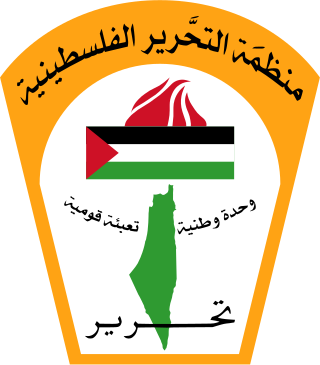
The Palestine Liberation Organization is a Palestinian nationalist coalition that is internationally recognized as the official representative of the Palestinian people in both the Palestinian territories and the diaspora. It is currently represented by the Palestinian Authority based in the West Bank city of Al-Bireh.

Zionism is an ethnocultural nationalist movement that emerged in Europe in the late 19th century and aimed for the establishment of a national home for the Jewish people through the colonization of Palestine, an area roughly corresponding to the Land of Israel in Judaism, and of central importance in Jewish history. Zionists wanted to create a Jewish state in Palestine with as much land, as many Jews, and as few Palestinian Arabs as possible.

Ramallah is a Palestinian city in the central West Bank, that serves as the de facto administrative capital of the State of Palestine. It is situated on the Judaean Mountains, 10 km north of Jerusalem, at an average elevation of 872 meters (2,861 ft) above sea level, adjacent to al-Bireh.

The Israeli–Palestinian conflict is an ongoing military and political conflict about land and self-determination within the territory of the former Mandatory Palestine. Key aspects of the conflict include the Israeli occupation of the West Bank and Gaza Strip, the status of Jerusalem, Israeli settlements, borders, security, water rights, the permit regime, Palestinian freedom of movement, and the Palestinian right of return.
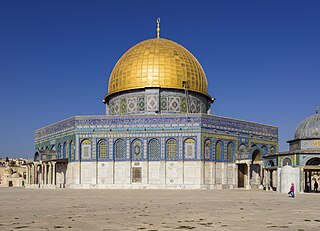
The history of the State of Palestine describes the creation and evolution of the State of Palestine in the West Bank and Gaza Strip. During the British mandate period, numerous plans of partition of Palestine were proposed but without the agreement of all parties. In 1947, the United Nations Partition Plan for Palestine was voted for. The leaders of the Jewish Agency for Palestine accepted parts of the plan, while Arab leaders refused it. This triggered the 1947–1949 Palestine war and led, in 1948, to the establishment of the state of Israel on a part of Mandate Palestine as the Mandate came to an end.
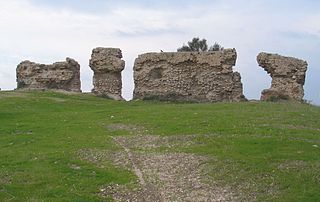
Ashkelon or Ashqelon is a coastal city in the Southern District of Israel on the Mediterranean coast, 50 kilometres (30 mi) south of Tel Aviv, and 13 kilometres (8 mi) north of the border with the Gaza Strip.

The occupied Palestinian territories, also referred to as the Occupied Palestinian Territory and the Palestinian territories, consist of the West Bank and the Gaza Strip—two regions of the former British Mandate for Palestine that have been occupied by Israel since the Six-Day War of 1967. These territories make up the State of Palestine, which was self-declared by the Palestine Liberation Organization in 1988 and is recognized by 146 out of 193 UN member states.
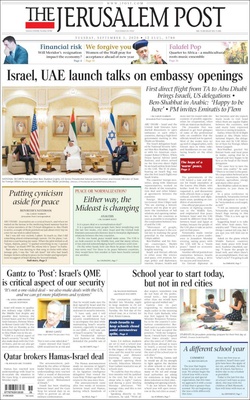
The Jerusalem Post is an English language Israeli broadsheet newspaper based in Jerusalem, Israel, founded in 1932 during the British Mandate of Palestine by Gershon Agron as The Palestine Post. In 1950, it changed its name to The Jerusalem Post. In 2004, the paper was bought by Mirkaei Tikshoret, a diversified Israeli media firm controlled by investor Eli Azur. The Jerusalem Post is published in English. Previously, it also had a French edition.

Palestine, officially the State of Palestine, is a country in the southern Levant region of West Asia recognized by 146 out of 193 UN member states. It encompasses the Israeli-occupied West Bank, including East Jerusalem, and the Gaza Strip, collectively known as the occupied Palestinian territories, within the broader geographic and historical Palestine region. Palestine shares most of its borders with Israel, and it borders Jordan to the east and Egypt to the southwest. It has a total land area of 6,020 square kilometres (2,320 sq mi) while its population exceeds five million people. Its proclaimed capital is Jerusalem, while Ramallah serves as its administrative center. Gaza City was its largest city prior to evacuations in 2023.
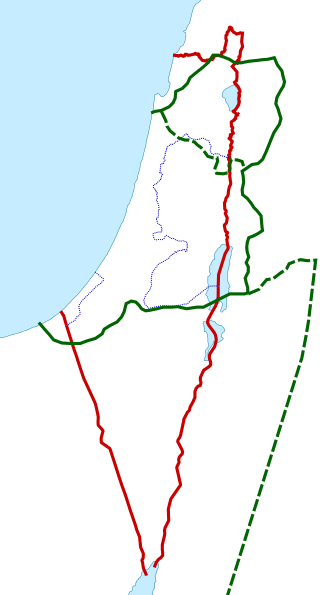
The region of Palestine, also known as historic Palestine, is a geographical area in West Asia. It includes modern-day Israel and Palestine, as well as parts of northwestern Jordan in some definitions. Other names for the region include Canaan, the Promised Land, the Land of Israel, or the Holy Land.

The Palestine national football team, governed by the Palestinian Football Association, represents Palestine in men's international football. The squad is under the global jurisdiction of FIFA, and is governed continentally by the Asian Football Confederation (AFC).

Situated between three continents, the region of Palestine has a tumultuous history as a crossroads for religion, culture, commerce, and politics. The region was among the earliest to see human habitation, agricultural communities and civilization. In the Bronze Age, the Canaanites established city-states influenced by surrounding civilizations, among them Egypt, which ruled the area in the Late Bronze Age. During the Iron Age, two related Israelite kingdoms, Israel and Judah, controlled much of Palestine, while the Philistines occupied its southern coast. The Assyrians conquered the region in the 8th century BCE, then the Babylonians in c. 601 BCE, followed by the Persians who conquered the Babylonian Empire in 539 BCE. Alexander the Great conquered the Persian Empire in the late 330s BCE, beginning Hellenization.
Palestine 194 is an ongoing diplomatic campaign by the Palestinian National Authority to gain membership in the United Nations for the State of Palestine. The name of the campaign is a reference to Palestine becoming the 194th member of the UN. The UN campaign is part of a strategy to gain international recognition of the State of Palestine, based on the borders prior to the Six-Day War, with East Jerusalem as its capital. The initiative developed during a two-year impasse in negotiations with Israel that followed the latter's refusal to freeze its settlement activities in the West Bank. The campaign was reported in the media as early as late 2009, and gained prominence during the leadup to the 66th Session of the General Assembly in September 2011. Palestinian President Mahmoud Abbas submitted the application to the Secretary-General Ban Ki-moon on 23 September 2011, which the Security Council has yet to vote on.
The foreign relations of the State of Palestine have been conducted since the establishment of the Palestine Liberation Organization (PLO) in 1964. Since the Oslo Accords, it seeks to obtain universal recognition for the State of Palestine on the 1967 borders, with East Jerusalem as its capital. As of 21 June 2024, 146 of the 193 United Nations (UN) member states officially recognize the State of Palestine.

Mandatory Palestine was a geopolitical entity that existed between 1920 and 1948 in the region of Palestine under the terms of the League of Nations Mandate for Palestine.
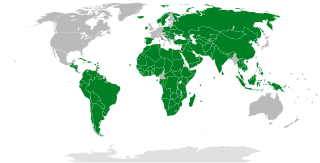
As of June 2024, the State of Palestine is recognized as a sovereign state by 146 of the 193 member states of the United Nations, or just over 75% of all UN members. It has been a non-member observer state of the United Nations General Assembly since November 2012. This limited status is largely due to the fact that the United States, a permanent member of the UN Security Council with veto power, has consistently used its veto or threatened to do so to block Palestine's full UN membership.